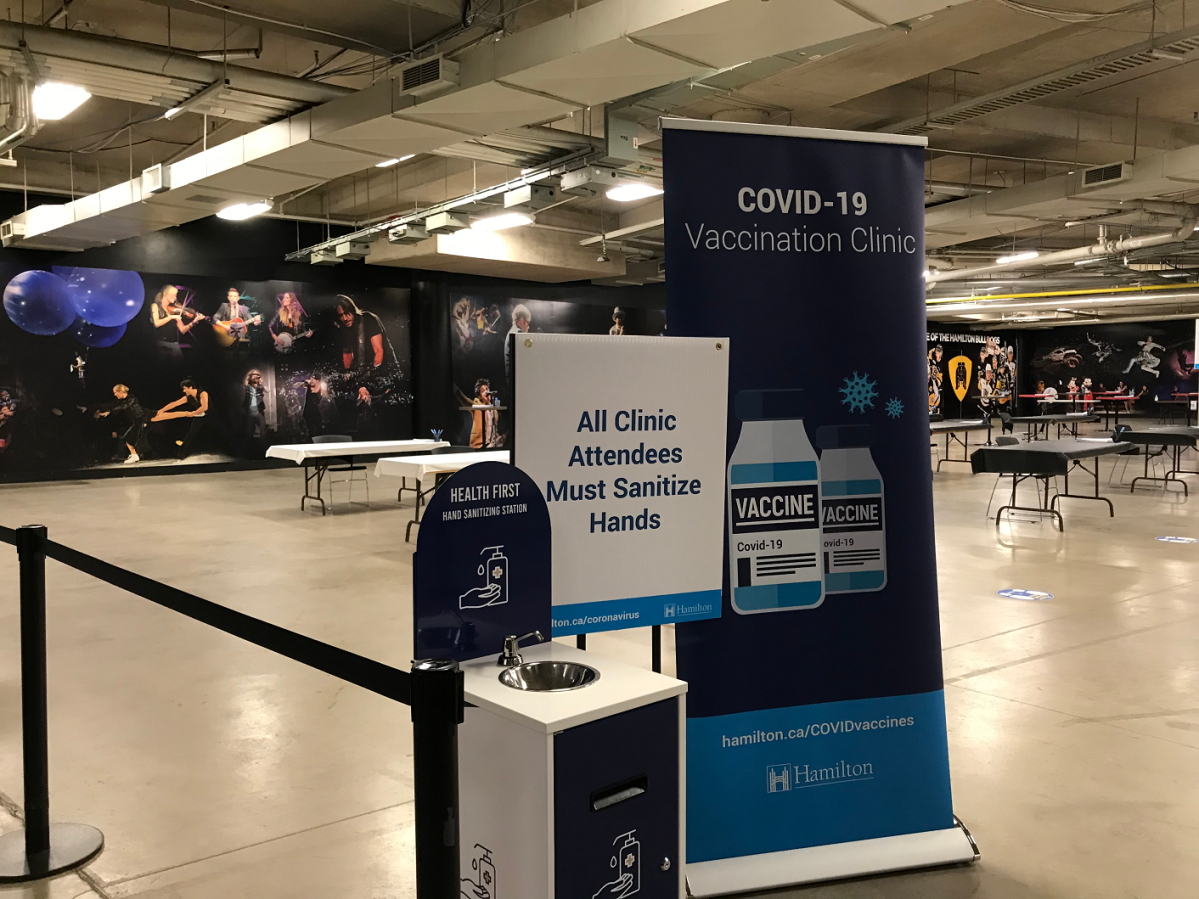Demand for the COVID-19 vaccine in Hamilton is outpacing supply, and the city’s mayor is calling on the province to send more of Ontario’s supply to “hot spot” regions like Hamilton.

During a Tuesday interview on Global News Radio 900 CHML’s Scott Thompson Show, Mayor Fred Eisenberger said the city is ready and willing to deliver more doses of the vaccine.
With cases and hospitalizations rising in Hamilton, he said the need for additional supply is greater than ever.
“There’s a need to bring more vaccine into areas where the cases are the most severe and most contagious,” said Eisenberger.
“We’ve got areas — like Hamilton, like Peel, Brampton, Mississauga — where the lion’s share of the cases are happening right now. Should that not get some additional attention in terms of the vaccine? Because that actually helps the entire province knock down the spread of the virus.”
Hamilton is currently administering vaccines through three mass clinics at Hamilton General Hospital, St. Joseph’s Healthcare’s West 5th campus and the FirstOntario Centre arena downtown.
Mobile pop-up clinics are also moving throughout the city, and pharmacies and primary care physicians are distributing the Oxford-AstraZeneca vaccine.
Eisenberger said another mass vaccination clinic that was scheduled to open in the city’s east end this month has been postponed due to the lack of vaccine supply.
“We have actually stalled opening up the Rosedale Arena …. we just don’t have enough vaccine. So it’d be kind of a false set up to have people standing there, but nobody’s there to book appointments for because the vaccine isn’t available.”
He said the city has the capacity to vaccinate up to 10,000 people per day through its various clinics, but with the existing supply, appointments are now completely booked into May.
Dr. Elizabeth Richardson, Hamilton’s chief medical officer of health, said the city is receiving a “steady” supply of the Pfizer-BioNTech and AstraZeneca vaccines, but it’s not enough to increase volume at this time.

Get breaking National news
“Our supply continues to be at a rate that doesn’t allow us to open to the desired sort of rate of thousands of vaccines being administered today,” said Dr. Richardson during the city’s weekly media briefing.
“So, there do need to be choices that are made. There is sequencing that needs to be done. And we need to do that quite thoughtfully.”
She referenced other regions that are moving forward and expanding vaccine eligibility to more groups but said there are a number of factors that need to be considered when asking why Hamilton isn’t moving as quickly as other areas.
One issue is that Hamilton relies on the provincial booking portal, which currently is only booking appointments for residents 60 and older, as well as residents 50 and older living in postal codes beginning with L9C and L8W.
Other eligible groups — including residents 50 and older living in three other “hot spots” in Hamilton — can only book by calling the city’s COVID-19 hotline at 905-974-9848.
Dr. Richardson said Hamilton is also prioritizing groups based on the advice of its vaccination task force.
“These groups provide advice on sequencing based on our local understanding around community capacities, needs, opportunities and of course, on what the specific supply is for our area.”
This past weekend, public health began working with Hamilton paramedics to roll out the vaccine to homebound residents who cannot access one of the city’s mass clinics for whatever reason.
“These are people who are identified either through home care or through their primary care physician who are homebound and needing that type of support to get vaccinated,” said Dr. Richardson.
Public health has not yet begun vaccinating people with health conditions, despite that segment of the population being eligible in phase two of the vaccination framework.
Dr. Richardson said they’re working with hospitals and health care providers to determine the best way to reach people who are highest-risk and high risk, with more information expected later in the week.
“Particularly for those who are on some form of treatment, there’s a real discussion that needs to happen between their treating specialist and the person to talk about when exactly that vaccine should happen. So we’re definitely working that through with those groups and they are sorting out how best to deliver the vaccine.”
To date, a total of 136,763 doses of a COVID-19 vaccine have been administered in Hamilton, which the city said equates to 23.7 per cent of all eligible residents receiving at least one dose.
Those who can book an appointment for a COVID-19 vaccine in Hamilton include anyone 60 and older, those 55 and older who can receive the AstraZeneca vaccine through a pharmacy or their primary care provider, individuals 50 and older living in one of five “hot spot” postal codes (L8W, L9C, L9K, L8L, and L8N), all Indigenous adults, chronic home health care recipients and their essential caregivers, front-line health care staff, residents and workers in long-term care and retirement homes, residents and staff in shelters or other community/congregate living facilities, and special education workers (who must call the province’s COVID-19 hotline at 1‑833‑943‑3900).
While the province has expanded eligibility for the vaccine to adults between the ages of 18 and 49 in some “hot spots” in Toronto and Peel, that eligibility has not yet been extended to other “hot spot” regions in Ontario.




_848x480_1397405763961.jpg?h=article-hero-560-keepratio&w=article-hero-small-keepratio&crop=1&quality=70&strip=all)



Comments